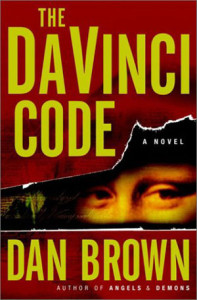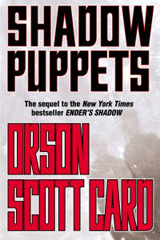Mike Brotherton brought Adam Robert’s Guardian piece to my attention. I can paraphrase the article very succinctly (which is rare for me): “Since science fiction is about the future, and the future is not now, science fiction is about otherness. And is therefore liberal and good. Except that some people (conservatives) hate otherness, so they write stories about killing aliens. And love authority. PS – I hate conservatives.”

You can probably tell I don’t think too much of this piece, but I do think it’s an interesting topic. I love sci-fi, and I’m also fascinated by how political ideologies battle it out in pop culture. That’s actually pretty boring in most media because there isn’t much of a battle. Hollywood is about as politically homogeneous as they come, and soF when it comes to politics there’s not a lot going on. You either get orchestrated propaganda, egregious digs at conservatives, or–very rarely–you get relatively nuanced perspectives precisely because there’s so little threat conservatism that it can occasionally be trotted out like a strange zoo creature. No, the most interesting political battles by far are fought in the thriller / action section of the New York Times best sellers. You’ve got all kinds of conservatives, from Tom Clancy on down, but also plenty of blatant liberals like Dan Brown. Both sides interject their politics freely and in not-so-subtle ways, and it’s fascinating to read. So, if I were gong to talk about politics in books, that’s where I’d start.
But Adam Roberts writes sci-fi so he wants to talk about sci-fi. Well, alright then. Let’s drag this argument under a spotlight and take a look.
First of all, the idea that “future” is a proxy for “other” is a stretch. By that logic, all fiction (since it’s about something other than reality) would be intrinsically liberal and all non-fiction (since it’s about reality) would be intrinsically conservative. This might be true for a very, very philosophical definition of “liberal” and “conservative”, but clearly not for anything that actually looks like modern politics in the US or in the UK.
Secondly, there really isn’t that much of a dichotomy between conservatives and liberals in sci-fi. The vast majority of sci-fi writers are liberals, pure and simple. I’d say the next largest segment would be the libertarians. Roberts cites Heinlein as a great conservative, but the only way you could think that is if the only Heinlein story you ever read was Starship Troopers. That book has a decidedly militaristic / authoritarian vibe. But the man who practiced open relationships (in real life) and wrote satirical descriptions of a free-love Jesus (Stranger in a Strange Land) cannot be seriously categorized as “conservative”.

Roberts only real conservative is Orson Scott Card. Card is, interestingly enough, a Democrat, but since he’s Mormon that doesn’t mean what it might mean to most Americans. In any case, he is most famous for coming out staunchly in opposition to gay marriage–both in his books and in his public writing–and also for lacing his reasoning with apocalyptic prophecies of the literal downfall of American civilization. But Card, despite his stature, is an exception that proves the rule. Here’s a fun trick: pick another famous science fiction author who is conservative. I can name a couple more, but they are all dead. Phillip K. Dick was so outraged by the Roe v. Wade decision that he wrote an infamous short story about a society that arbitrarily decided that you weren’t considered a person until you could do calculus, and Walter M. Miller Jr’s beautiful “Canticle for Leibowitz” is an elegant paen to his Catholic faith. Both, like I mentioned, are no longer with us.
But when you try to think of sci-fi writers who are overtly liberal, it’s hard to know when to stop listing names. John Scalzi’s politics are not readily apparent in his fiction, but he runs one of the biggest blogs on the Internet and is not shy about his leftwing politics there. Cory Doctorow’s books are basically political sermons with a sci-fi candy coating. Kim Stanely Robinson wrote an entire trilogy (Red Mars, Green Mars, Blue Mars) to put both is staggering economic ignorance and left-wing political ideology on display, and then recently wrote another novel in the same vein. These are all guys writing today (and there are more), but of course some of the greats were also very liberal. Ursula K. Leguin comes immediately to mind. It’s practically impossible to read a work of modern science fiction without being bashed over the head by certain, core liberal beliefs that sci-fi writers have really glommed onto. The most notable is the idea that sex can and should be excised completely from any consideration (cultural, emotional, etc.) and treated as a purely recreational activity with no implications beyond the immediate gratification of physical desire. If sci-fi, especially male-written sci-fi, had a single, core article of faith that would be it.
So much for Robert’s argument. As for Brotherton, I’m glad to see that (despite being the kind of religiously intolerant liberal who refers to Orson Scott Card as belonging to a “fundamentalist cult”) he rejects the notion that science fiction is intrinsically liberal. But he also rejects the notion that there’s an ideological battle of any kind going on, and there I think he goes to far. As I mentioned in a comment to his piece: it’s really hard to separate the metaphors of “battle of ideas” and “marketplace of ideals”. The key concept in each is competition.
Richard Dawkins’ conception of the ideas-as-genetics makes sense here: There is no demilitarized zone in the struggle for survival, either of genes or of memes.
“of course some of the greats were also very liberal. Ursula K. Leguin comes immediately to mind.”
Ursula Leguin is liberal? I really have to disagree. Have you read Earthsea?
I’m always a bit perplexed by this idea that authoritariansim = conservatism. It seems to me that many of the modern progressive political ideas of the Left lead to more a more authoritarian state.
Also, why must a conservative fear change? Could it be that the conservative’s aversion to any particular liberal idea is actually rational?
Most anyone who thinks seriously and sincerely about politics is hard to categorize, and I would put Le Guin in that category. However, works like “The Left Hand of Darkness” and “The Dispossessed” have tended to put her firmly in the liberal camp. She’s identified with gender issues and concern with minority characters.
I’ve read the first few Earthsea books, but I”m not sure what about them was really political.
I actually think that’s why the charge is so common. Whether it’s intentional distraction or–more likely, I think–a sort of projection, liberals tend to see in conservatism exactly what is worst in their own ideology.
Have you read Jonah Goldberg’s Liberal Fascism, by chance? Definitely a great read on the history of the accusation that authoritarianism is a conservative concept vs. the actuality that fascism was originally much more closely associated with the left than the right.
Also: I wonder if conservatives also project their worst tendencies on to liberals? My guess would be that they do, but I hadn’t really thought about it until now.
There’s a strain of conservatism that really is about conserving what is valuable in the past, so I think this accusation has more validity.
Related to this, I’ve read a few quotes from Leszek Kolakowski, and I need to read more, but here’s a brief argument (just a few paragraphs) where he argues that it is possible to be a conservative-liberal-socialist: http://www.mrbauld.com/conlibsoc.html
There’s another, similar quote that I can’t find now, but in any case I need to read Modernity on Endless Trial for sure.
“Stranger in a Strange Land” was my first introduction to adult sci-fi, and I found it disturbing. I was not yet a conservative, and I wasn’t particularly faithful either. Heinlein still managed to push my interests away from science fiction :). If I ever get back into reading more science fiction, I need to take a look at your recommendations. I’ll take your word for it on this genre, because I haven’t read enough to form an opinion.
Wow, “Stranger in a Strange Land” is a really, really weird intro to the genre! I’m not surprised it pushed you away! Most people start with something classical and harmless, like maybe “Foundation” by Isaac Asimov.
I’m actually kind of bad at making recommendations, however, because I’ve read too much. It distorts what I get out of sci-fi when I read it because I tend to gravitate towards things that are kind of deep in the genre, where I can understand that an author in the 2000s is deliberately referrencing something that was common in the 1980s which in turn was built on something done in the 1950s, which in turn reflects the 1920s… you get the picture.
But I guess one recommendation that’s a pretty sure fire success because it’s incredibly popular but also really true to what makes sci-fi sci-fi would be Ender’s Game. Give that a read–it’s pretty quick and easy–and let me know what you think! (It’s by Orson Scott Card, and there’s actually a movie coming out–finally–this year.)
Thanks, Nathaniel! I will definitely put that on my list. I’m always looking for something new to read. When my dad calls me, his second question is usually, “So what are you reading right now?” And I hate it when I suddenly realize that my answer is “nothing”. That happens when life gets kind of crazy, and that’s where I am right now — with no book in hand. So it’s a good time to pick one up..
I have the same feeling: sometimes I realize I’m not reading a book and I know something has gone wrong with my life.
In any case, if you do get a chance to read it let me know what you think!
I don’t think anything about Earthsea was political. Near as I could tell, the first three books of Earthsea are an allegory for repentance, the light of Christ first entering an unbeliever’s heart, and the doubts and denials that plague believers in dry times when God seems absent (respectively).
But then maybe I totally misread those books?
The fourth Earthsea is really a feminist book, or is intended to be. It’s about a woman who runs her late husband’s farm and looks after an orphaned girl. And also there’s a wizard and a dragon shows up near the end.
I don’t think Dispossessed makes her liberal. She’s writing *about* anarchists/communists, versus a kind of aristocratic mercantilism sort of social order. That makes her a science-fiction author.
I haven’t read “Left Hand of Darkness”, or very much of her science fiction.
She’s definitely opposed to *fascism*. That definitely comes across in her work. So are both of us, I imagine.
In “Lathe of Heaven” she presents a kind of Huxleyan dystopia where the government regulates all healthcare and forces people to “voluntary” counseling. There is nothing remotely positive about the government in that picture.
In most of her books that involve fictional worlds, she has chosen characters’ skin tones to be darker. I think that’s also just good science fiction; she’s questioning something normally taken for granted.
I guess that makes her liberal? I don’t know. I’ve tried to look up her political beliefs before, but I love her fiction so much that I was mostly scared to do so.
I avoided Goldberg’s ‘Liberal Fascism’ for a long time because of the name. It sounded too much like one of those typical political books. But after reading a glowing review from Thomas Sowell, I picked it up and was thoroughly impressed.
“Hell’s Foundations Quiver” is a very conservative/libertarian novel about people escaping the oppression of a worldwide leftist welfare state. It’s available only on the Kindle so far.
http://www.amazon.com/Foundations-Quiver-Bridgeport-Duology-ebook/dp/B00C7XS0KA/ref=pd_rhf_gw_p_t_2_BZSF